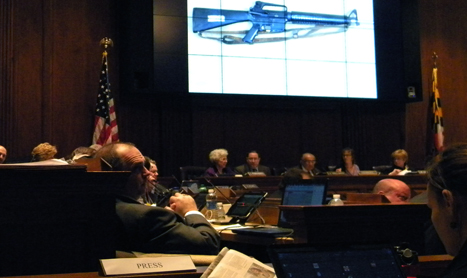ANNAPOLIS – A day after the Senate passed one of the strictest gun control bills in the nation, Gov. Martin O’Malley told two House committees that if his bill “saves even one more life, it’s as if we’ve saved the world.”
But opponents, still stinging over their defeat in the Senate, turned out en masse to testify against the Firearm Safety Act of 2013, which they consider a violation of their Second Amendment rights.
“These reforms are common sense,” said O’Malley, reading from prepared remarks that closely resembled the testimony he provided to the Senate Judicial Proceedings Committee last month.
He went on to describe the major provisions of the bill, HB 294, which include: a ban on assault weapons and high capacity magazines, licensing and fingerprinting requirements for handgun purchases, increased funding for school security and new restrictions on firearm access for the mentally ill.
O’Malley brought a cadre of law enforcement personnel and gun policy experts with him to testify in support of the bill.
Gun violence in Maryland is a “public health epidemic,” said James W. Johnson, Baltimore County’s chief of police, who urged that delegates keep the bill’s strongest restrictions intact.
“(Handgun licensing) will help law enforcement,” Johnson said. “Don’t take this from me.”
The licensing requirement and its controversial fingerprinting component were nearly stripped from the Senate version of the bill in the amendment process.
During the question and answer portion of the hearings, Delegate John Cluster Jr., R-Baltimore County, questioned the need for an assault rifle ban given that none of the murders in Maryland last year were committed with an assault weapon.
“Why would you want to wait for the first one?” responded Scott Shellenberger, Baltimore County state’s attorney. “I’m sure there weren’t any (assault weapon murders) in Newtown last year, either.”
Opponents of the bill stressed that the legislation would curtail citizens’ Second Amendment rights.
“It is wrong for the state of Maryland to require a license to exercise a fundamental right,” said Shannon Alford, state liaison for the National Rifle Association.

